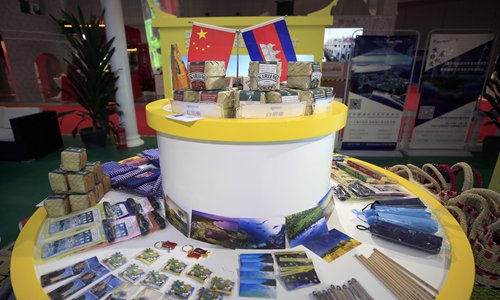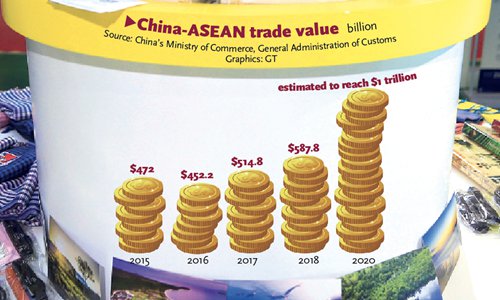HOME >> BUSINESS,SPECIAL-COVERAGE
ASEAN companies bring more goods to 2nd CIIE
By Xie Jun in Shanghai and Li Xuanmin in Beijing Source:Global Times Published: 2019/11/5 20:38:41
Event viewed as way to cement bilateral ties amid trade war with US

A view of the exhibition stand of Cambodia on Tuesday during the second China International Import Expo Photo: Yang Hui/GT

Graphics: GT
Boosted by the fruitful outcomes from the first China International Import Expo (CIIE), companies from the Association of Southeast Asian Nations (ASEAN) have been scaling up the volume and variety of products they brought to the 2nd import fair.
From shrimps, rice and bananas to coconut-based products, ASEAN companies are taking the fair as an opportunity to tap into a massive and growing market that is undergoing a swift consumption upgrade bolstered by a rising middle-class group.
Observers said that the import fair is of great significance in terms of cementing economic ties between China and ASEAN countries and adjusting each other's trade structure accordingly, particularly in the context of US-launched trade war.
Expanding trade between China and ASEAN countries will also help China to reduce reliance on US imports in such areas as agricultural and primary commodities.
At the booth of the Thailand-based Chia Tai Investment (CP Group) at the National Exhibition and Convention Center (NECC) in Shanghai, the Global Times saw live shrimps swimming in the water tank, fresh fruit including mango and durian as well as bird's nest on vivid display. This attracted crowds of Chinese visitors.
Ye Jian, vice chairman of the marketing department of CP Group, told the Global Times on Tuesday that this year marks the second time the Thai company is participating in the CIIE, and it has high expectations for the second CIIE to bring more high-quality Thai agricultural products to Chinese consumers.
"Last year, we signed about 3 billion yuan ($427 million) in preliminary agreements with Chinese companies. Some of them have been carried out, while others are still applying for import certificates or are in the processing stage. So we hope to drum up the volume of transactions and sign more deals this year," he said, adding that CP has been contacting Chinese supermarket chains and other online retail channels such as Alibaba's Hema Fresh for cooperation.
The group is confident of Chinese consumption power despite a global economic slowdown, and that's the reason why CP has multiplied the products at the fair and employed advanced logistics technology to keep products as fresh as possible.
According to Ye, last year, shrimps from Thailand were sold out ahead of the closing day and were extremely welcomed by Chinese consumers.
The Thai company has come up with an innovative dehydration transportation technique this year to ship seafood, which could keep container temperatures at a relatively low level. The new technique enables the shrimps to live longer and be more active after arriving in China.
In addition to Thai companies, large companies from the Philippines including Century Pacific Food, Fisherfarms and Monde Nissin are also promoting their products, ranging from coconut-based products and bananas to fruit preserves, mango flour, dried fruit and fruit juices at the fair.
China has been the biggest importer of Philippine bananas since 2018.
Recognizing the huge consumption potential of Chinese residents, the Philippines is looking to tap into a lucrative consumer market by catering to the current health trend among Chinese consumers, according to a statement the Center for the International Trade Expositions and Missions (CITEM) sent to the Global Times on Tuesday.
The CITEM is the export promotion arm of the Philippines Department of Trade and Industry (DTI).
"The Philippine delegation's participation will strengthen and improve the country's trade relations [with China], across Asia and the rest of the world," said DTI-CITEM Executive Director Pauline Suaco-Juan.
From quantity to quality
In 2018, bilateral trade between China and ASEAN reached $587.8 billion, an increase of nearly 11 times compared with 2002. In October, an upgraded China-ASEAN trade protocol that covers a broader scope than the original pact, came into effect.
Ge Hongliang, deputy director of the College of ASEAN Studies at Guangxi University for Nationalities, told the Global Times that the 2nd CIIE could be a significant step in upgrading bilateral trade relations between China and ASEAN countries.
"The CIIE will make the ties go from quantity to quality. The fair is not merely about pushing up the trade volume, but more importantly in adjusting the trade structure and relocating the industrial chain amid the heated trade war between China and the US," Ge said.
China could import more agricultural and industrial products as well as primary commodities from ASEAN countries to replace US imports. For ASEAN companies, they could seek high-end manufacturing and light industry products from China instead of the US.
For the next step, industry players hope that China and ASEAN countries could jointly build a more intertwined industrial chain to boost trade ties.
Also, "we hope China could expand import quotas so that more agricultural products from Thailand could enter China," Ye said.
Posted in: ECONOMY,FOCUS